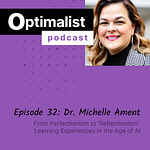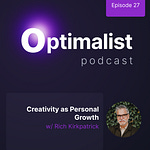**SPECIAL ANNOUNCEMENT**
Before getting to today’s episode, we wanted to include an announcement for the latest and transformational classroom hardware solution by Swivl - just launched today. We are excited to introduce Mirror - Swivl’s newest platform aimed to realize the potential of reflection in classrooms through AI. When designing this device, we wanted to make reflecting fun and engaging for students and easily navigable for teachers. Mirror automates reflections using AI and generates insights teachers need to help their classrooms run better than ever.
Starting today, we’re launching a limited-time partnership campaign to gather excitement for Mirror. We’re inviting all educators to participate and become a vital component of Mirror’s evolution and development.
Learn more about the campaign—including how to win 1 of 100 complimentary devices—by clicking the button below.
Podcast Ep 29: What Is Higher Order Curiosity and How Might We Foster It?
In this 3rd solo episode, or mini-episode, of the Optimalist Podcast, Sara introduces us to higher order curiosity and its significance in shaping an optimal future with AI. This is likely a term you’re not thinking about or have ever heard, but in the Optimalist community we are thinking about it - and other higher order capabilities - all of the time. We examine the challenges of fostering curiosity and highlight the impact of biological changes, safety impulses, and technology. We raise concerns about the downsides of technology while emphasizing the importance of resilience.
So today let’s listen to an August edition of our newsletter where Swivl co-founder and CEO, Brian Lamb, began writing about the new human skills that will arise as we move into the era of existence alongside AI.
And as you know, if you’re a regular listener, The Optimalist Podcast has set out to examine the higher order capabilities we need to build an optimal future with AI. So let’s explore the elements of human flourishing, and figure out together how we cultivate them.
Chapters
(0:00:08) Exploring Higher Order Curiosity and Human Skills with AI
(0:01:04) Shifting to Higher-Order Capabilities in the Era of AI
(0:03:00) Pushing Human Capabilities to Work Effectively Alongside AI
(0:11:46) The Downside of Excessive Internet Engagement
(0:13:29) Exceptional Curiosity and the Importance of Broadly Curious Individuals
(0:14:35) The Problem with Following Passion as a Reliable Model
(0:15:25) Fostering Higher-Order Curiosity for an Optimal Future with AI
(0:17:40) The Real Cure for Curiosity: Embracing the Hardships of Life
------
Click here to access the full text of the Optimalist newsletter on The Cure for Curiosity
Find us & join us:
Follow Sara Candela on Twitter at @Scandela9
Subscribe to The Optimalist Podcast on Spotify, Apple Podcasts, your favorite podcast player - or right here, on Substack - to get each episode as soon as it’s released.
Join our Community Discord server at https://discord.gg/SWhQ76mEZD
The Optimalist Podcast is brought to you by Swivl. At Swivl, we understand that the biggest challenge in education is the rate of change. Policy revisions, technological advancements (accelerated by AI), evolving job markets, and ongoing research constantly identifying new best practices are only some of the factors affecting the rate of change in education. To learn how Swivl can help you be more reflective, engaged, and adaptable, visit swivl.com. You can also follow us on Twitter.
Follow Swivl on Twitter at @Swivl
Credits:
Music: “Goodnight, Shapeshifter” by MusicForNothing, used under Creative Commons BY-ND 3.0.
Audio Editing & Production: Tim Belmont (@tbelmontedu)
















Share this post